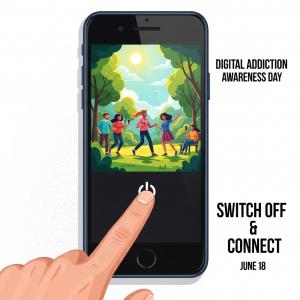With Teen Depression Doubled, June 18 'Switch Off' Targets Digital Addiction
A global initiative calls for a 24-hour digital detox to combat addictive tech and promote real-world connection and mental wellness.
"It was like he was physically in the room, but his mind was somewhere else entirely," Maria shared. "The bright boy I knew was being replaced by someone anxious and perpetually distracted."
Alex’s experience is a deeply personal glimpse into a global issue: digital addiction. This isn't a distant problem; it's a pressing crisis subtly reshaping lives and demanding worldwide attention. Conflicts over screen time are common, with a 2024 Pew Research Center survey revealing that 38% of parents and teens report regular arguments about phone use.
The statistics are stark. A major 2022 meta-analysis in Clinical Psychology Review, covering over 2.1 million people, found that an estimated 26.99% may experience smartphone addiction, 17.42% social media addiction, 14.22% internet addiction, and 6.04% gaming addiction.
In regions like Hong Kong, the rise of specialized rehabilitation centers for digital addiction is a stark indicator of what may become more common globally if these trends continue. Digital Addiction Awareness Day, observed annually on June 18, aims to bring this challenge into sharp focus. It is an initiative striving to become the primary global day dedicated to this cause.
Young people are particularly at risk. The U.S. Surgeon General's 2023 Advisory noted that teens spending over three hours daily on social media face double the risk of depression and anxiety symptoms. Social psychologist Jonathan Haidt, in his book The Anxious Generation, further details how the decline in teen mental well-being correlates with the rise of smartphone use. His research highlights a troubling reality: many teens now average over seven hours of daily screen time for entertainment alone, outside of schoolwork.
The economic impact is also considerable. The global online gambling market alone is projected by Mordor Intelligence to exceed $103 billion in 2025. But the human cost is even more devastating. The harm from gambling addiction—intensified by its constant online accessibility and AI-driven platforms—is profound. Problem gambling is linked to severe consequences, including tragic rates of suicide. Experts like Jay Sayta, an Indian technology and gaming lawyer, has raised concerns about insufficient enforcement of regulations and advisories regarding online gambling advertising.
This crisis isn't simply about weak willpower; it's significantly fueled by "addictive-by-design" technology. Dr. Anna Lembke, psychiatrist and author of Dopamine Nation, describes the smartphone as "the modern-day hypodermic needle, delivering digital dopamine 24/7." Sophisticated Artificial Intelligence (AI) algorithms are increasingly engineered to maximize user engagement by tapping into the brain's reward systems, a fact noted in numerous analyses of persuasive technologies.
Inspiring legislative efforts, like Vermont's S.80 bill (proposing a Digital Addictions Awareness Day with free state park entry) and moves in France to ban phones in schools, offer models for action. The digitaladdictionawareness.org website is developing as a resource hub, with the long-term vision of seeking broader international recognition for the Day. Key policy goals include protecting young people through measures like smartphone-free classrooms, holding tech companies accountable with requirements for algorithm transparency, and building community resilience through awareness and screen-free initiatives.
Digital Addiction Awareness Day on June 18th calls for a conscious pause. The core initiative this year is a 24-hour "Switch Off" challenge, encouraging individuals and communities globally to disconnect from their devices. The day aims to increase understanding of digital addiction, promote healthy tech habits, and advocate for systemic changes.
Digital addiction is a complex issue impacting mental health and society at large. June 18th is an opportunity to confront this challenge collectively and advocate for a future where technology empowers, not ensnares. The date June 18 is chosen strategically, often falling near Father's Day and aligning with Juneteenth (June 19th) and International Picnic Day (June 18th)—events that naturally foster outdoor activities and real-world connections over virtual ones.
International Digital Addiction Awareness Day
Yearly Observance June 18
email us here
Visit us on social media:
X
Legal Disclaimer:
EIN Presswire provides this news content "as is" without warranty of any kind. We do not accept any responsibility or liability for the accuracy, content, images, videos, licenses, completeness, legality, or reliability of the information contained in this article. If you have any complaints or copyright issues related to this article, kindly contact the author above.
Tinplate Packaging Market to Reach USD 3,079 Million by 2035 | AJ Packaging, Ball Corporation, Ardagh Group Lead
DisplayRide & Tarsus Partner to Bring the World’s Most Advanced AI Dashcam solution to Canada
RefillGenie’s Affordable Online Prescription Refills Now Available in 47 States
Więcej ważnych informacji
 Jedynka Newserii
Jedynka Newserii

 Jedynka Newserii
Jedynka Newserii

Prawo

Kolejne polskie miasta chcą być przyjazne dzieciom. Planują stworzyć najmłodszym dobre warunki do rozwoju
Cztery miasta w Polsce posiadają tytuł Miasta Przyjaznego Dzieciom nadany przez UNICEF Polska. Dziewięć kolejnych miast czeka na certyfikację, a w ostatnich miesiącach do programu zgłosiło się kilka następnych. Na całym świecie inicjatywa została przyjęta już w ponad 4 tys. samorządów, a w Hiszpanii objęła połowę dziecięcej populacji miast. Program UNICEF-u ma na celu zachęcenie włodarzy do traktowania najmłodszych obywateli w sposób podmiotowy, respektowania ich praw i zaproszenia ich do współdecydowania o przyszłości.
Przemysł
W ciągu roku w Polsce ubyło 500 przedsiębiorstw odzieżowo-tekstylnych. Problemem są spadki zamówień z Europy Zachodniej i wzrost kosztów

Wartość rynku odzieżowego w Polsce wynosi 66,9 mld zł, z czego 10 mld zł to wartość krajowej produkcji – wynika z danych PIOT. Od czasu pandemii branża mierzy się z szeregiem wyzwań, wśród których najpoważniejsze to wzrost kosztów pracy i produkcji, przerwane łańcuchy dostaw i spadek zamówień – zarówno w kraju, jak i za granicą, a także wzrost nieuczciwej konkurencji na rynku, czyli głównie importu z Chin. Skala wyzwań sprawia, że w ubiegłym roku z rynku zniknęło 500 firm. Producenci odzieży apelują do rządu o wsparcie.
Handel
D. Obajtek: Orlen powinien być o 30–40 proc. większą spółką. Byłoby to z korzyścią dla konsumentów

Orlen jest największym polskim przedsiębiorstwem. Jego przychody ze sprzedaży w 2024 roku wyniosły blisko 295 mln zł, a rok wcześniej – ponad 372 mln – wynika z raportu Rzeczpospolitej „Lista 500”. W ubiegłorocznym rankingu Fortune 500 uwzględniającym największe korporacje znalazł się na 216. miejscu na świecie i 44. w Europie. Według Daniela Obajtka, europosła PiS-u i byłego prezesa Orlenu, spółka powinna jeszcze urosnąć, tym samym gwarantując konsumentom szereg korzyści, a także przyspieszać inwestycje m.in. w obszarze petrochemii i energetyki zero- oraz niskoemisyjnej.
Partner serwisu
Szkolenia

Akademia Newserii
Akademia Newserii to projekt, w ramach którego najlepsi polscy dziennikarze biznesowi, giełdowi oraz lifestylowi, a także szkoleniowcy z wieloletnim doświadczeniem dzielą się swoją wiedzą nt. pracy z mediami.









.gif)

 |
| |
| |
|